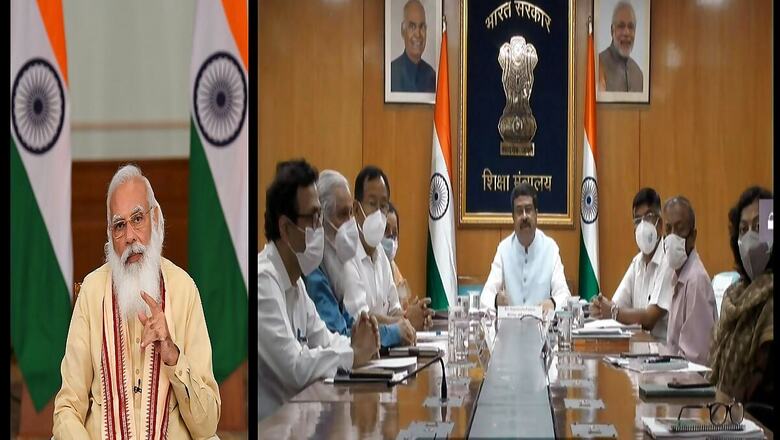
views
A day after the cabinet reshuffle Prime Minister Narendra Modi interacted with the directors of Centrally-funded technical institutions (CFTIs) in the presence of the newly appointed Minister of Education Dharmendra Pradhan, telling the heads of institutes to “develop an ecosystem of technological education in Indian languages and translate global journals into regional languages.”
The IITs had earlier deferred technical education in their mother tongue. AICTE encouraged technical institutions to look at offering technical education in regional language as an available option.
With regards to translations of English journals into local languages, the experts reflected on the practical challenges of the task and quoted a 2012 study by Research Trends that showed how English was the preferred language of research among the scientific community over the years.
According to the Research Trends 2012 study, researchers publishing in languages other than English tend to do so somewhat more in the softer disciplines (health sciences, social sciences, psychology, and arts and Humanities) than in the harder ones (physics, engineering, and materials science).
The 2012 study further said, “English clearly continues to be the preferred language of scientific communication, there are still plenty of disciplines within which researchers continue to publish in their native language as well.”
The task of translations is huge given the sheer number available to be translated, which according to the study would be 80% because “80% of all the journals indexed in Scopus are published in English.”
“Recent bibliometrics show that the number of published scientific papers has climbed by 8–9% each year over the past several decades. In the biomedical field alone, more than 1 million papers pour into the PubMed database each year — about two papers per minute. For researchers who are already overwhelmed by bench and field-work, grant-writing, publishing, trying to navigate the growing deluge of data has become a second job,” said a member of CFTI on condition of anonymity.
Further added, “Here’s how some of them cope. Every year about a million papers are written in just the biomedical field alone. In all areas, it will be about 10 million papers easily. It will be mind-boggling to think that we convert these papers into all local languages,” said an expert who wishes to remain anonymous.
Among others present at the video conference meeting, which was planned a week ago, more than 100 Heads of Institutions joined MoS education Annpurna Devi, MoS Dr. Rajkumar Ranjan Singh, and MoS Dr. Subhas Sarkar along with senior officials Amit Khare.
The backdrop of the meeting was performance and presence in QS World Rankings in which IISc Bangalore became the world’s top research university and along with IIT Bombay and Delhi became the top 200 Indian institutions in the world.
At the meeting, the Prime Minister lauded the R&D work done by these institutions towards meeting the challenges posed by Covid.
During the interaction, Professor Govindan Rangarajan of IISc Bangalore, Prof Subhasis Chaudhuri of IIT Bombay, Prof. Bhaskar Ramamurthi of IIT Madras, and Prof Abhay Karandikar of IIT Kanpur, gave presentations to the Prime Minister and highlighted various ongoing projects, academic work, and new research being done in the country.
IIT Kanpur presented the research and innovation & future road map of the institute including the plan for the upcoming School of Medical Research & Technology (SMRT). They shared their research in Cancer Cell Therapy, Modular hospitals, Hotspot prediction, Ventilators production, 5Gi wireless technology and Multidisciplinary research.
IIT Madras presented a project titled ‘itihas’ to predict hotspots of covid within 100 meters using Aarogya Setu and telecommunication data mobile. They have researched hotspot analysis systems.
The institutes also shared their program for online education with e-courses. For instance, IIT Madras is starting an online graduate program in data science, which others are also planning to start. IIT Kanpur has planned an e-masters program in some specific areas like cybersecurity and communication while IISc discussed their e-masters in data science and business analytics.
Read all the Latest News, Breaking News and Coronavirus News here.




















Comments
0 comment